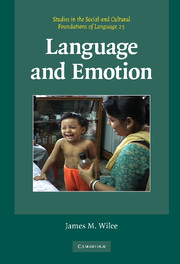Book contents
- Frontmatter
- Contents
- List of figures
- List of transcripts
- Acknowledgements
- Introduction
- Part I Theory
- 1 Defining the domain
- 2 The relationship of language and emotion
- 3 Approaches to language and emotion
- 4 The panhuman and the particular
- Part II Language, power, and honor
- Part III Identification and identity
- Part IV Histories of language and emotion
- Notes
- Glossary
- References
- Index
- STUDIES IN THE SOCIAL AND CULTURAL FOUNDATIONS OF LANGUAGE
3 - Approaches to language and emotion
Published online by Cambridge University Press: 05 June 2012
- Frontmatter
- Contents
- List of figures
- List of transcripts
- Acknowledgements
- Introduction
- Part I Theory
- 1 Defining the domain
- 2 The relationship of language and emotion
- 3 Approaches to language and emotion
- 4 The panhuman and the particular
- Part II Language, power, and honor
- Part III Identification and identity
- Part IV Histories of language and emotion
- Notes
- Glossary
- References
- Index
- STUDIES IN THE SOCIAL AND CULTURAL FOUNDATIONS OF LANGUAGE
Summary
Introduction
This chapter surveys four major theories of language and emotion. It is appropriate to start with (1) language socialization approaches, which deal (though not exclusively) with the start of life. In fact, the same scholars who pioneered this approach have also pioneered linguistic anthropological work on emotion. We turn next to cognitive theories (2). Although there is often a tension between cognitivist models which tend toward universalism and the more dominant cultural relativist schools of anthropological thought, we will explore attempts to reconcile these two positions. Although cognitive and the (3) phenomenological approaches dealt with next in this chapter both concern “human sentience” (Desjarlais 1997: 248), they pursue this concern in very different ways. I focus again, in that section, on a kind of reconciliation – drawing on Desjarlais, who has worked to refigure phenomenological anthropology, to insert in phenomenological studies a materialist concern, i.e., a focus on the political economy that contextualizes subjectivity. The final section presents other materialist approaches to language and emotion (4).
Socialization theories and their relevance to language and emotion
Language socialization and the socialization of emotion
In a remarkable series of studies, Elinor Ochs and Bambi Schieffelin have addressed the important anthropological topic of socialization – the process by which novices (including, but not limited to, children) become competent members of a particular society – using linguistic and ethnographic methods (e.g., Ochs and Schieffelin 1984; Ochs 1986; Schieffelin and Ochs 1986; Ochs 1988; B. Schieffelin 1990; Ochs and Taylor 2001).
- Type
- Chapter
- Information
- Language and Emotion , pp. 55 - 66Publisher: Cambridge University PressPrint publication year: 2009

